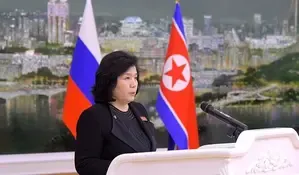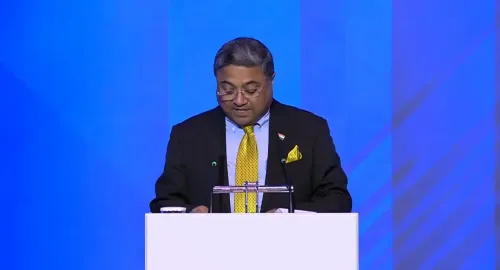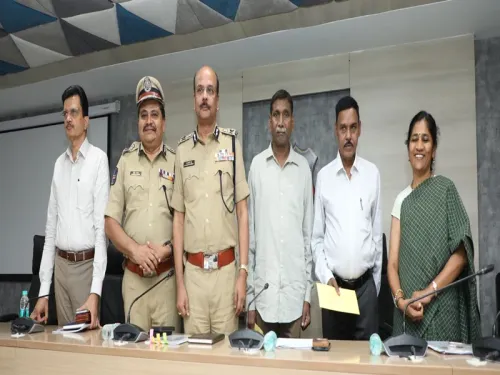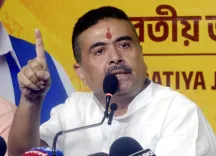India Aims to Foster Positive Relations with Bangladesh: Defence Minister Rajnath Singh (IANS Interview)
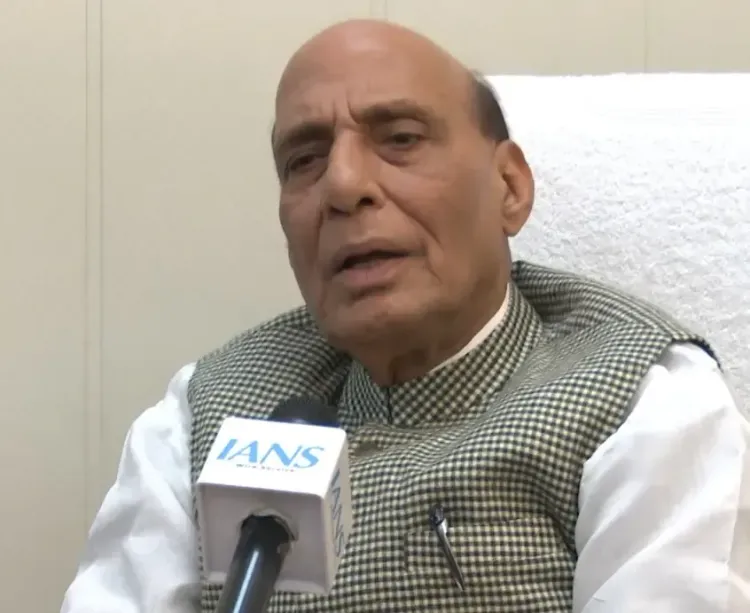
Synopsis
Key Takeaways
- India values good relations with neighboring countries, including Bangladesh.
- Concerns over law and order in Bangladesh under Muhammad Yunus's interim government.
- Importance of protecting minorities in Bangladesh, especially Hindus and Ahmadiyyas.
- Need for democratic processes and inclusive elections in Bangladesh.
- Ongoing issues with the return of extremists to Bangladesh.
New Delhi, March 8 (NationPress) Defence Minister Rajnath Singh stated on Saturday that India has consistently championed the importance of fostering strong ties with its neighboring countries, and Bangladesh is no exception.
"India always aims to cultivate positive relations with its neighbors, and Bangladesh is our neighbor as well. We make concerted efforts to uphold good relations with them because (former Prime Minister) Atal Bihari Vajpayee used to assert that while we can change friends, we cannot change our neighbors. Therefore, we are committed to maintaining amicable relations with Bangladesh," Singh conveyed in an exclusive interview with IANS.
New Delhi has expressed concern regarding the worsening law and order conditions in Bangladesh under the current leadership of Muhammad Yunus, which has faced significant criticism for releasing extremist figures and absolving several Islamists since the fall of the Awami League government headed by former Prime Minister Sheikh Hasina in August 2024.
"We advocate for a stable, peaceful, inclusive, and progressive Bangladesh where all matters are resolved through democratic processes and by conducting inclusive elections. Our worries are heightened by the deteriorating law and order situation, worsened by the release of violent extremists previously convicted of serious crimes," stated Randhir Jaiswal, spokesperson for the Ministry of External Affairs (MEA), during a weekly media briefing in New Delhi on Friday.
As Bangladesh plunged into turmoil following the collapse of the Awami League government, the Yunus-led administration has been accused of granting leniency to Islamist factions and relaxing the mandatory security clearance protocols for Pakistani citizens applying for visas, thus enabling the return of numerous notorious terror suspects who had previously sought refuge in Pakistan.
With ongoing attacks on minorities in Bangladesh, particularly targeting the Hindu and Ahmadiyya communities, the MEA reiterated the urgent nature of this issue and condemned the interim government's ineffective investigations, which have proven to be superficial.
"We have consistently emphasized that the interim government of Bangladesh holds the responsibility to protect Hindus and other minorities, along with their properties and places of worship. So far, only 1254 out of 2374 reported incidents between August 5, 2024, and February 16, 2025, have been confirmed by the police. Furthermore, 98 percent of these verified incidents have been classified as political in nature. We expect Bangladesh to thoroughly investigate and ensure that all perpetrators of violence, arson, and killings are brought to justice without any biases," the MEA spokesperson stated on Friday.
Last month, External Affairs Minister (EAM) S. Jaishankar, during discussions with Bangladesh Foreign Affairs Advisor Touhid Hossain in Muscat, underscored the significance of not normalizing terrorism in Bangladesh.
Despite India's efforts to normalize relations with its neighboring country, the interim government in Dhaka continues to make "unfounded accusations" and targets minorities, particularly the Hindu community of Bangladesh.
In December, Foreign Secretary Vikram Misri visited Dhaka, conveying New Delhi's concerns regarding the safety and welfare of minorities in Bangladesh to the interim government's leadership.

